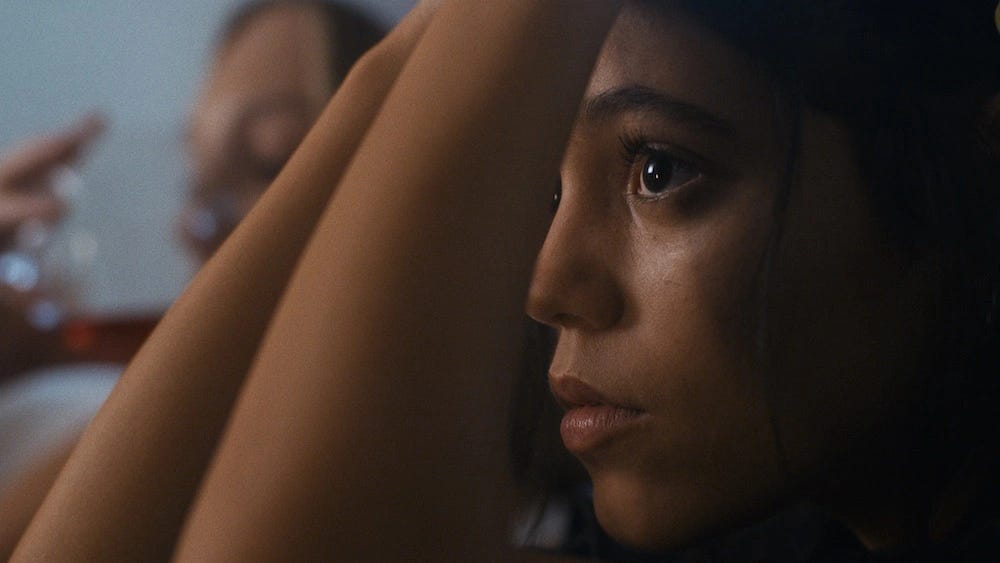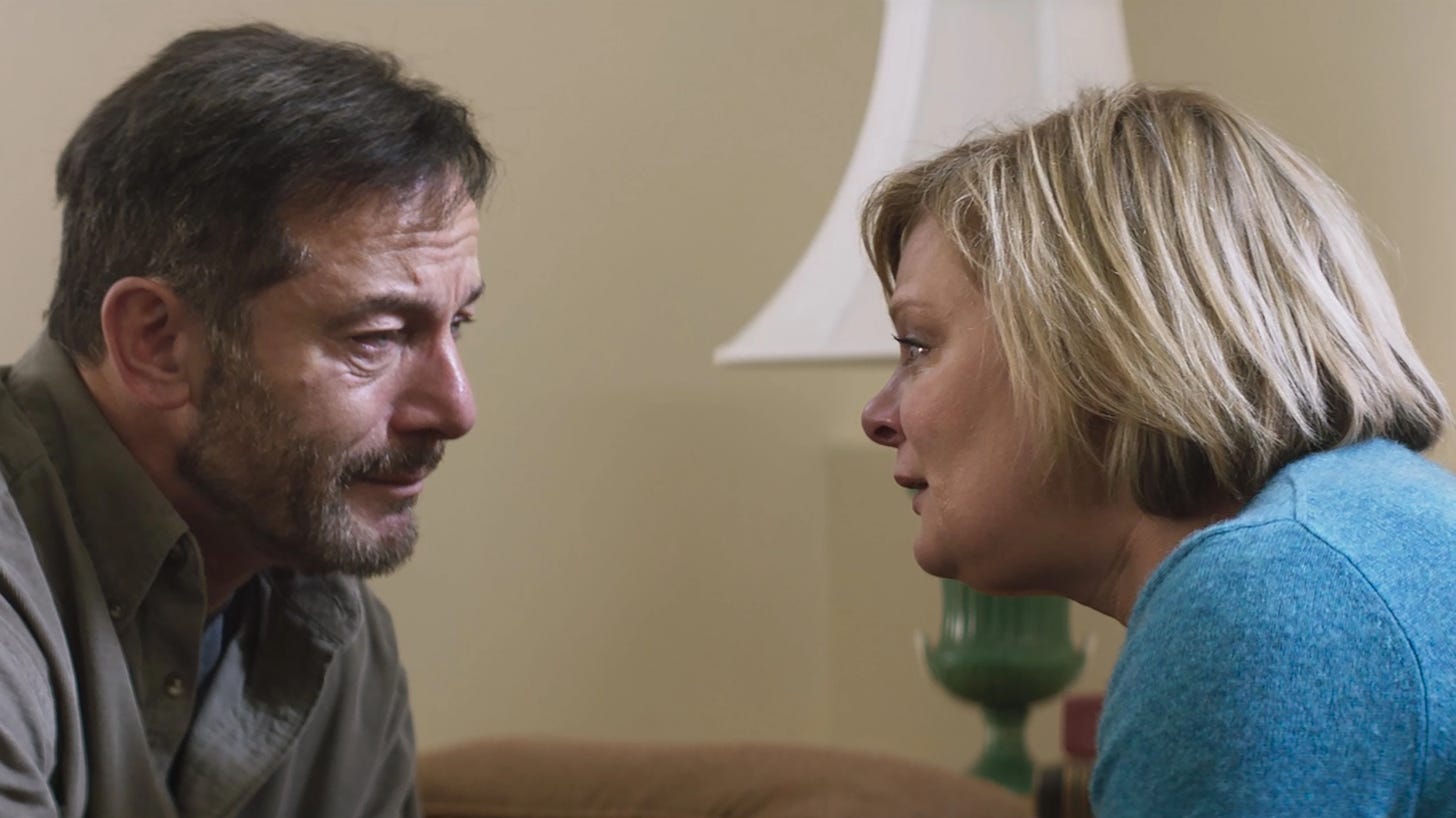Hidden Truths: How two school shooting dramas imagine traumas we cannot see
Two independent films from last year, 'The Fallout' and 'Mass,' square up to a hard conversation.
When cultural anthropologists (or just, you know, ordinary people) look back 10, 20 or 50 years from now, what will the movies tell them about the way we lived today? Specifically, what will they learn about the hard stuff—about the wars in Afghanistan and Iraq, about the escalating climate crisis, about police violence against unarmed Black people, about Charlottesville, 1/6, and the worst manifestations of Trumpism? It’s a question I think about often, particularly when it comes to contemporary Hollywood, which has mostly been whistling past all of it, save for the occasional Black studio drama or an allusive moment in an otherwise unrelated genre film. Those in the future may be able to read the tenor of our times, the way we feel can understand something of the past when watching the post-war noir boom, but studios today are less and less willing to get into the specifics.
Then again, our national tragedies are absorbed in real life, too—or, at a maximum, processed into grist for the political mill. When students at Marjory Stoneman Douglas High School in Florida, soon to be known as the “Parkland kids,” opted to reject the rote “thoughts and prayers” gestures that attended the shooting deaths of 17 of their classmates, it was both inspiring and a little surreal. We had absorbed so many school shootings—Columbine, Blacksburg, Roseburg, Newtown, etc.—that even teen survivors immediately understood the political forces preventing change and opted to seize the moment to inspire change. They had so thoroughly internalized the limitations of debate over gun control that there was an almost “meta” quality to their response, an eyeroll of recognition. When the March For Our Lives rallies happened barely more than a month later, the Parkland kids had defined themselves through raw emotion, relentlessness in the face of obstruction, and a talent for social media ethering.
Two independent films from last year, Fran Kranz’s Mass and Megan Park’s The Fallout—the latter just released directly to HBO Max—seek to do what Hollywood cannot bring itself to, and what our culture often cannot, either: Take stock of the trauma that, while maybe invisible, we all know is there. The Fallout is by far the weaker of the two films, as if we’re dropping in on a Very Special Episode of The O.C, but it does directly address a Parkland-like situation. As its heroine, Vada (Jenna Ortega), comes to terms with a shooting that she experiences huddled into a bathroom stall, her relationship with her closest friend, Nick (Will Ropp), starts to change. He’s a “Parkland kid”-type, busy converting his terror and anger into activism. She can’t bring herself to do that. She can’t do much of anything, in fact.
There’s a revelatory moment in Us Kids, one of several Parkland documentaries, that captures that kind of vulnerability on camera, like lightning in a bottle. The students who have committed to the March For Our Lives movement have been traveling around the country by bus, staging events to support gun control, but also confronting gun rights supporters, often angrily, face to face. During a listening session on gun violence, one of the students, Cameron Kasky, who’d famously challenged Florida GOP senator Marco Rubio on stage, reaches his breaking point and has to leave the tour. It’s a reminder that these kids are human beings, not political beings, reeling from a world that’s been completely reordered by tragedy.
Park’s decision to focus on a case like Vada, rather than someone more directly impacted by the shooting, is a shrewd one for many reasons. Vada finds herself feeling like she doesn’t have the right to her own emotions. She can’t say that a close friend died. She didn’t witness the massacre. And she doesn’t attempt to take righteous action with her buddy Nick, who the film labels crudely as a gay-best-friend type. (Again, this is a Very Special Episode.) And yet she’s been through something wrenching and needs to heal, too, even as others might have seen their lives more fully ripped apart. The Fallout focuses more on the hidden stories of kids like Vada who have become unmoored, shaken dramatically out of every assumption they might have had about their safety and future. It is a state of sadness, uncertainty, and epic teenage ennui.
The change for Vada happens the instant the gunshots pop off. In the minutes before, she’s issuing jokey texts to Nick about how Mia (Maddie Ziegler), the other girl in the bathroom, is glamming herself up for picture day. Then she and Mia are locking themselves in a stall together as the shooting escalates, joined later by Quinton (Niles Fitch), who’s covered in his brother’s blood. In the days that follow, Mia becomes the only person Vada feels comfortable talking to, despite their previous differences. Park doesn’t steer away from high-school-movie formula in defining these young women: Vada is a virginal good-girl type, with excellent grades and understanding parents. Mia is a vain Instagram influencer with absent parents and easy, casual access to good wine and weed. Take away the shooting and The Fallout is a by-the-numbers teen drama waiting to happen.
The shooting does not get taken away, of course, and Vada and Mia grow into archetypes when they might otherwise be understood as clichés. There are missteps elsewhere, too, like the casting of Shailene Woodley as a therapist who does too much of the film’s thematic heavy-lifting, or an excruciating catharsis where Vada and her father shout their feelings off a local cliffside. But the small point the film does make is essential: There are countless kids like Vada who may not technically be the victims of a school shooting but remain within the psychological blast radius. The Fallout insists that they been seen, too.
Mass is far blunter, though it’s fascinating to see how Kranz backs his way into a potentially explosive confrontation. The early scenes of this four-hander are about setting up accommodations in a well-lighted room off a church basement, but for what we don’t know. (Unless you’re reading this essay about school shooting movies. Then you know.) Is the table placement okay? Where should the tissue box go? Are snacks really necessary? Even when we see a couple idling nervously in their car outside the church, wondering if and when to go in, we don’t know what exactly has them spooked. When it becomes clear that the parents of the boy killed in a school shooting are meeting with the parents of the shooter, also dead, the uncertainty persists: It’s not immediately obvious which couple is responsible for which kid.
This is a dramatic strategy on Kranz’s part, and a brilliant one. He wants the audience to know first—and ultimately foremost—that we’re looking at the parents of children who have died violently. In our eyes, they are on equal footing at this moment. There are details to be hashed out, points of wrenching contention, but Mass is about the process of two sets of parents coming to understand each other at the end as we perceive them at the beginning. That’s a steep hill to climb, of course, because it’s hard to see the parents of a killer as anything other than negligent failures, not least for them. This is a film set in a church called Mass. Forgiveness is the goal. But getting there means facing agonizing truths.
The meeting takes place six years after the tragedy, presumably not far from the school itself. Jay (Jason Isaacs) and Gail (Martha Plimpton) lost their son Evan to the shooter and no longer live in town. Richard (Reed Birney) and Linda (Ann Dowd) raised the boy, Hayden, who shot his classmates and, ultimately, himself. Evan and Hayden both had siblings who turned out more or less okay, though maybe a little less in the case of Evan’s sister, who’s applying to colleges after what sounds like a difficult stretch. Kranz, who also scripted, carefully parcels out information about the couples’ histories together, with references to a lawsuit and hurtful press statements, as well as personal letters. It hasn’t been easy, though there’s hope that this meeting can help them find some measure of peace.
Linda brings Gail a lovely arrangement of flowers, which becomes its own kind of symbolism, because Gail doesn’t know what to do with them. They’re an awkward distraction at the center of the table, and there’s no easy way to take them on the flight back home. (But hey, it’s a nice gesture.) The good news is that while all four parents are temperamentally different—Jay percolating with on-the-surface fury and grief, Richard a bit defensive, Linda earnest sometimes to a fault, Gail quiet but intense—they have the courage and heart to square up to a meeting they know will be an excruciating ordeal.
As an actor known mostly for his work for Joss Whedon—he was the brainiac tech scientist in Dollhouse, Claudio in 2012’s Much Ado About Nothing, and “The Fool” in The Cabin in the Woods—Kranz showed a gift for thinking (and joking) through roles, speaking as quickly as he can, with his mouth running slower than his brain. Mass has that quality to it, in that it’s the work of an intelligent person who loses himself in the sheer emotional density of an issue, someone who will thrash through thorny underbrush to get to the other side. Richard and Gail have a particularly hard time accepting responsibility for what happened while still arguing that they raised Hayden the best they could, even as they saw ominous warning signs in his behavior.
Though subtly crafted for the screen and superbly performed by all four actors, Mass is a frugal production, easily adaptable to the smallest of stages without having to change a single comma in the script. But such productions have to be frugal, because there’s so little interest in talking about school shootings beyond the extremely flawed discourse of news and politics. We’re not challenged often enough to imagine what parents like these two couples are experiencing in the long term, and artists like Kranz who insist on imagining it do so without great commercial expectations. There’s something to be gained, as a viewer, from being in that headspace. If nothing else, Mass teaches the value of squaring up to our problems.
L






Has anyone seen the film, Spontaneous, yet? It came out under the radar in 2020 but I think it's the first great coming of age film that touches on modern day school shootings. (The kids spontaneously combust here so it's not directly about it but it's still dealing with the trauma of random, senseless violence that school shooting victims have to live with)